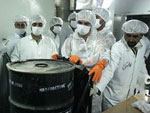 The Hill: “Trust but verify” was Ronald Reagan’s favorite expression about his dealing with the Soviet Union’s Mikhail Gorbachev (in Russian, it rhymes: doverai, no proverai, but the meaning remains even without the rhyme).
The Hill: “Trust but verify” was Ronald Reagan’s favorite expression about his dealing with the Soviet Union’s Mikhail Gorbachev (in Russian, it rhymes: doverai, no proverai, but the meaning remains even without the rhyme).
The Hill
By Soona Samsami

“Trust but verify” was Ronald Reagan’s favorite expression about his dealing with the Soviet Union’s Mikhail Gorbachev (in Russian, it rhymes: doverai, no proverai, but the meaning remains even without the rhyme).
Today, that phrase should be updated in regard to Iran’s nuclear program: Verify, but NEVER trust!
The interim agreement reached by Tehran and the P5+1 (the UN Security Council permanent members, plus Germany) may look promising, but it is rife with potential problems and loopholes.
The first is that word ‘trust.’ Why should any state trust a regime that murders its own people by the tens of thousands, supports terrorists in the region and worldwide, hires assassins to murder foreign diplomats in Washington, DC, develops a clandestine nuclear weapons program through three decades of deception and denials and keeps the murderous Assad regime in power?
The simple answer is: It shouldn’t.
Let’s look at Iran’s nuclear record, for example. From the beginning, the country’s rulers have said they were only developing this power source for internal energy demands; yet, they kept many sites secret, pushed out inspectors several times when they might have been getting too close to the truth, and claimed nuclear power as a sovereign right.
Only a few days ago, Supreme Leader Ali Khamenei drew a “red line” that could not be crossed in the recent negotiations. But when the interim agreement was reached, he declared victory in the talks: “I thank God that … the new government… was able to legitimize the Iranian nation’s nuclear program on the international stage and take the initial step in a way that the nuclear rights and the enrichment rights of the Iranian nation are acknowledged by world powers where before they had tried to deny them …”
If he declared victory, it must mean the ‘red line’ has not been crossed and the P5+1 have capitulated.
The reaction in Congress, in the region, and among the Iranian Diaspora, supports that position. Iran now has another six months to stall, perhaps to hide some facilities from the peering eyes of international inspectors. It has done so in the past; why not again?
And while that goes on, Tehran gets some badly-needed relief from the crippling sanctions that brought it to the table in the first place.
Perhaps we should not just hope but work for the best from this deal. Maryam Rajavi, president-elect of the leading Iranian dissident organization, the National Council of Resistance of Iran (NCRI), noted that Khamenei was forced to “retreat” in the face of the Iranian people’s widespread opposition to its policies, which she says have “undermined Iran’s national interests and have only resulted in greater poverty and destruction of the country’s economy.”
She added that a more decisive approach would have gotten the P5+1 a much better deal. “They could have dismantled the regime’s bomb-making program in its entirety during the current negotiations,” she said.
Now, what is next? The international community must be decisive and firm, and never trust a regime with basic evil intentions and intrinsic deceptiveness.
It is essential that Iran’s compliance be put under a microscope and that there be a clear understanding that any deviation would bring back the relaxed sanctions, plus more.
The regime’s untrustworthiness has been demonstrated time and again, thanks to the diligence of the NCRI, the eyes and ears of the free world regarding what goes on inside Iran. In the last decade, the NCRI has revealed scores of sites and centers involved in the Iranian regime’s clandestine nuclear project including Natanz and Arak (August 2002), Kala-Electric (February 2003), the Center for Command and Control of nuclear weaponization in an area known as Mojdeh (February 2008), and subsequently the new center known as SPND (July 2011).
Thus, if the objective is to dismantle Tehran’s nuclear weapons program, anything less than a complete halt to all enrichment-related activities along with the UN ability to have snap inspections of Iranian nuclear sites would allow the religious fascism ruling Iran to eventually build the Bomb.
In truth, the only assurance that Iran’s nuclear weapons program can be halted would be the replacement of the dictatorship with an elected government that seeks to make Iran a beacon of democracy, secularism, civil and human rights, and freedom for all.
To get to that point, we must start here: Verify but never trust.
Samsami is the U.S. Representative of the National Council of Resistance of Iran, a coalition of opposition forces seeking to replace the theocratic regime in Iran with a democratic, secular and non-nuclear republic.


